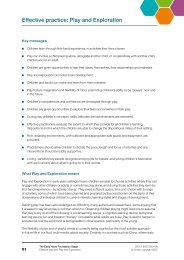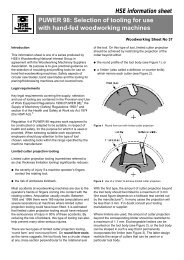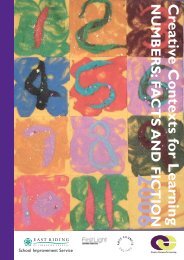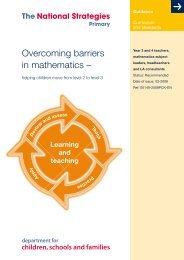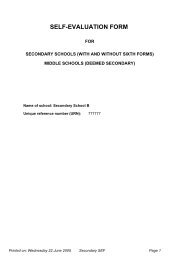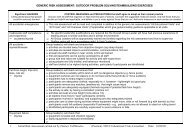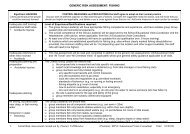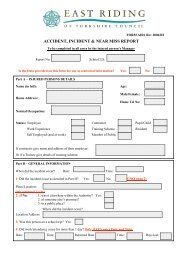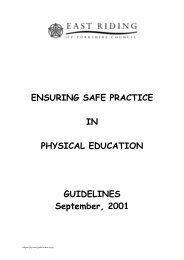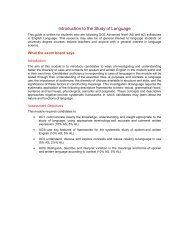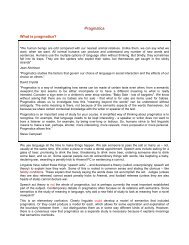Year 6 - eRiding
Year 6 - eRiding
Year 6 - eRiding
You also want an ePaper? Increase the reach of your titles
YUMPU automatically turns print PDFs into web optimized ePapers that Google loves.
Raising Attainment in<br />
Literacy through<br />
Geography in the School<br />
Grounds<br />
<strong>Year</strong> Six<br />
Literacy<br />
Geography<br />
School
Acknowledgments<br />
We would like to thank staff and pupils at the following schools for participating in<br />
the Pilot of the School Grounds Geography Projects.<br />
• Baguley Hall Primary School<br />
• Barlow Hall Primary School<br />
• Benchill Primary School<br />
• Broadoak Primary School<br />
• Crab Lane Primary School<br />
• SS John Fisher / St Thomas Moore Roman Catholic Primary School<br />
• St. Clare’s Roman Catholic Primary School<br />
• St. Dunstan’s Roman Catholic Primary School<br />
• The Willows Primary School<br />
• Victoria Avenue Community Primary School<br />
This pack was produced by<br />
Holly Preston<br />
Brian Holmes<br />
School Grounds Education and<br />
Development Officer<br />
Groundwork Manchester,<br />
Salford and Trafford<br />
Associate Humanities Advisor<br />
Children’s Services<br />
Manchester City Council
Contents Page<br />
Introduction<br />
Pages<br />
• Welcome 4<br />
• Why use your School Grounds? 5<br />
• What is Fieldwork? 6-7<br />
Planning a Project<br />
• Exemplar Plan 8<br />
• School Planning Example 9<br />
Implementing a Project<br />
Fieldwork Activity Ideas<br />
• Environmental Review 10-11<br />
• How is the environment of the school managed? 12-13<br />
• Land-Ise Recording Activity 14<br />
• Environmental Quality Assessment 15<br />
Case Studies .<br />
• <strong>Year</strong> 5 / 6– How we use water? 16— 24<br />
Useful Contacts<br />
25—26
Welcome to Geography in the School<br />
Grounds<br />
This resource pack is designed to introduce you to an exciting way to teach Geography<br />
that is relevant to your pupils using your school grounds and building as the resource,<br />
whilst raising pupil’s attainment in literacy.<br />
Literacy<br />
Geography<br />
School<br />
Grounds<br />
The Geography in the School Grounds Project was piloted in 2007 with ten schools in the<br />
North and South of Manchester. This resource will guide you through the process of implementing<br />
relevant geographical enquiry and fieldwork into your pupils’ learning experiences.<br />
We have included project outlines and activity ideas along with guidance on how<br />
to make fieldwork simple. We also highlight key writing opportunities that lead on from<br />
fieldwork. The pilot was reviewed positively by all the schools who participated. We have<br />
included some examples of the work that was achieved through this pilot phase to help<br />
you see what can be achieved through the project and to inspire you to adopt some of the<br />
ideas within your own delivery of the Geography curriculum.<br />
The Aims of the Geography in the School Grounds Project included:<br />
• To raise pupils’ standards of attainment and achievement in writing.<br />
• To improve the use of the school grounds for curriculum purposes.<br />
• To improve the quality of pupils first hand experiences in geography.<br />
The Objectives of the Geography in the School Grounds Project included:<br />
• To develop geography focused activities through the use of the school grounds.<br />
• To use a geographical focus to stimulate and develop specific writing activities<br />
linked to the literacy framework.<br />
• To use the school building and grounds to undertake geographical enquiries and<br />
investigations.<br />
• To develop aspects of citizenship and education for sustainability through<br />
geographical enquiry in the school building and grounds.
Why use your school grounds?<br />
School grounds offer “uniquely rich and rewarding learning experiences for children of all<br />
ages, backgrounds and abilities, giving them a greater understanding of the world around<br />
them”.<br />
Education Minister Stephen Twigg, MP<br />
At the National School Grounds Week launch 2003<br />
You may be asking “why use your school grounds to deliver the Geography Curriculum?”<br />
As the quote above indicates there is increasing evidence and support for the value of<br />
school grounds as a resource for delivering the national curriculum. The Learning Outside<br />
the Classroom Manifesto (2007) cites the educational benefits of learning in the school<br />
grounds and other locations outside of the conventional classroom as offering “quality learning<br />
experiences in ‘real’ situations” which “have the capacity to raise achievement across a<br />
range of subjects and to develop better personal and social skills.”<br />
The benefits of using the school site as a subject for pupils to investigate and monitor<br />
through geographical enquiry include:<br />
• The investigations are relevant to all pupils participating in the project.<br />
• Work in the school grounds offers pupils first hand experiences.<br />
• The school grounds is a safe location for pupils to work in.<br />
• The school grounds provide easy access to opportunities for children to learn outside<br />
the classroom.<br />
• Class teachers are in charge of setting the learning objectives of the lesson AND ensuring<br />
they are delivered in a way most appropriate to each child.<br />
• No transport is required to get pupils to the enquiry site.<br />
• Its FREE!
What is Fieldwork?<br />
Fieldwork = A practical, hands on activity that involves children learning OUTSIDE<br />
the classroom by carrying out an inquiry.<br />
Two key elements of successful fieldwork are:<br />
• to integrate the fieldwork activities within the unit of work and<br />
• to set the fieldwork activities within a clear context for the pupils.<br />
Opportunities for local geography and fieldwork within the National Curriculum<br />
The National Curriculum programmes of study at Key Stages One and Two require schools<br />
to undertake local studies in geography and to carry out practical geographical enquiries or<br />
fieldwork.<br />
Requirements for Key Stage One<br />
Pupils are required to study ‘the locality of the school’ and, in their study of localities to:<br />
• study at a local scale.<br />
• carry out fieldwork investigations outside the classroom.<br />
The school site (encompassing grounds and buildings) is the ideal starting point for studies<br />
of the local area.<br />
Pupils are also required to undertake ‘geographical enquiry’ and to specifically ‘use fieldwork<br />
skills’.
What is Fieldwork?<br />
Requirements for Key Stage Two<br />
Pupils are required to study localities and themes at a ‘local, regional and national scale’.<br />
This means building opportunities for pupils, where they occur and to build in case studies of<br />
a local element in:<br />
• ‘Water and its effects on landscapes and people, including the physical features of<br />
rivers or coasts and the processes of erosion of deposition that effect them’.<br />
• ‘How settlements differ and change, including why they differ in size and character, and<br />
an issue arising from changes in land-use.<br />
• ‘An environmental issue caused by change in an environment and the attempts to<br />
manage the environment sustainably.’<br />
Pupils in Key Stage Two are also specifically required to carry out fieldwork investigations<br />
outside the classroom. The school site offers an ideal location for practical geographical enquiry<br />
at a local scale.
<strong>Year</strong> Six<br />
Title and Focus Learning Outcomes Suggested Activities Writing Opportunities<br />
Water Project<br />
Investigating the use<br />
of water, in school<br />
and in the home, to<br />
raise awareness of,<br />
and develop, sustainable<br />
approaches to its<br />
use<br />
• To suggest geographical questions.<br />
• Use a variety of maps and photographs.<br />
• Use geographical vocabulary<br />
correctly.<br />
• Identify and explain the different<br />
views held by people about<br />
an environmental change.<br />
• Know and understand how the<br />
environment can be both damaged<br />
and improved.<br />
• Investigate the use of water in<br />
the home – essential and nonessential<br />
uses. How could the<br />
use of water in the home be improved?<br />
Recycling ideas.<br />
• Investigate the use of water in<br />
the school – essential and nonessential<br />
uses. How could the<br />
use of water in the school be<br />
improved?<br />
• Recycling ideas:<br />
⇒ Water Butts<br />
⇒ Rain gauges<br />
⇒ Watering the garden using<br />
rain water?<br />
• Ponds – making ponds<br />
sustainable<br />
www.waterintheschool.co.uk<br />
Pupils could:<br />
• Keep a diary of how water<br />
is used in the school/<br />
home for a week.<br />
• Create posters/ leaflets<br />
with ideas for recycling/<br />
saving water in school/<br />
home.<br />
• Create and explain flow<br />
charts for the water cycle.<br />
• Compare water use in<br />
school with elsewhere.<br />
Research the work of aid<br />
agencies in water provision<br />
in a less economically<br />
developed country<br />
(LEDC) – write a brief report/<br />
account of their<br />
findings.
Focus/ Key<br />
Question<br />
1 Where does water<br />
come from – water<br />
cycle?<br />
2 How do we use water<br />
at home?<br />
3 How could we improve<br />
our use of<br />
water at home?<br />
4 How do they use<br />
water in other<br />
places?<br />
OPTIONAL<br />
5 How do we use water<br />
in school?<br />
6 How could we improve<br />
our use of<br />
water in school?<br />
Y5 – Exploring a geographical issue: How we use water? – Outline Planning<br />
Saint John Fisher and Saint Thomas More’s Roman Catholic Primary School<br />
Learning Outcome: Pupils Suggested Activities Writing Opportunities<br />
• Understand how water/ rain is<br />
created through the water cycle<br />
• Be able to tell the difference between<br />
essential and non-essential<br />
uses<br />
Introductory information .re water and where it comes<br />
from.<br />
Brainstorm/ Mind Maps of all the ways in which pupils<br />
use water at home<br />
Differentiated between essential and non-essential use<br />
Pupils could produce a labelled<br />
diagram of the Water<br />
Cycle<br />
Pupils keep a diary for a<br />
week of all the ways they<br />
use water at home<br />
• Understand the principles of<br />
saving/ re-cycling water at home<br />
Pupils produce suggestions for how to save/ re-cycle<br />
water at home<br />
Pupils produce a poster/<br />
leaflet of their suggestions<br />
• Understand the importance of<br />
water and its scarcity in some parts<br />
of the world<br />
• Be able to tell the difference between<br />
essential and non-essential<br />
uses of water in school<br />
Pupils study an example of how water is used in a different<br />
locality<br />
Pupils make comparisons of the ways in which water is<br />
used in the different locality compared to their own experience.<br />
Information from www.wateraid.co.uk<br />
Brainstorm/ Mind Maps of all the ways in which water is<br />
used at school – classroom, around school, kitchen,<br />
school grounds, changing rooms/ toilets<br />
Differentiated between essential and non-essential use<br />
Information from www.waterintheschool.co.uk<br />
Pupils could produce a table<br />
of similarities and differences<br />
of the ways in which<br />
water is used in two different<br />
localities<br />
Pupils prepare questions<br />
and interview key people<br />
about uses of water in<br />
school – HT, site manager,<br />
CT, cook, TA<br />
• Understand the principles of<br />
saving/ re-cycling water in school<br />
Pupils produce suggestions for how to save/ re-cycle<br />
water in school<br />
.<br />
Information from www.waterintheschool.co.uk<br />
KEY WRITING TASK<br />
Pupils a report about their<br />
suggestions, including persuasive<br />
argument for how<br />
and why water in school<br />
should be conserved
Fieldwork Activity: Environmental Review<br />
This simple review is the one that is required when submitting for the Eco-Schools<br />
Bronze Award. It is a good place to start pupils off when investigating any of the<br />
environmental issues listed below. Please note that schools trying to achieve Silver or<br />
Green Flag status, must also complete a full environmental review to accompany the<br />
review carried out by pupils. This will be available from your schools Eco-Schools Coordinator<br />
or from the Eco-Schools website.<br />
Litter/Rubbish<br />
1. Is there too much litter on the ground in the school grounds? Yes No<br />
2. Does the school have organised litter picking sessions? Yes No<br />
3. Are there enough bins inside and outside, in the school grounds? Yes No<br />
Energy<br />
4. Are the lights left on in classrooms when people aren’t in them? Yes No<br />
5. Is it sometimes too hot in classrooms and the heating cannot<br />
be turned down? Yes No<br />
6. Are the computers in the ICT suite left on when not in use? Yes No<br />
Waste<br />
7. Does the school recycle its paper from classrooms and offices? Yes No<br />
8. Does the school compost its waste fruit/vegetables/weeds etc? Yes No<br />
9. Does the school try to buy goods made from recycled materials? Yes No<br />
Water<br />
10. Are there push-stop water-saving taps in the toilets? Yes No<br />
11. Are there water-saving devices on the urinals in the toilets? Yes No<br />
School Grounds<br />
12. Does the school have a growing area? Yes No<br />
13. Are there enough places for pupils to sit at playtime? Yes No<br />
Biodiversity<br />
14. Does the school have a wildlife area? Yes No<br />
15. How else do you try to attract wildlife into the school grounds? Yes No
Environmental Review continued.<br />
Transport<br />
16. Is there a problem with cars outside school before school<br />
and at home time? Yes No<br />
17. Is it possible for most pupils to walk/cycle to school or take<br />
public transport? Yes No<br />
Healthy Living<br />
18. Does the school have a fruit/healthy tuck shop at breaktimes? Yes No<br />
19. Are healthy options encouraged for school dinners? Yes No<br />
20. Is drinking water available in class? Yes No<br />
Global Perspective<br />
21. Do pupils consider how actions taken within the school affect people and the<br />
environment locally and globally? Yes No
Fieldwork Activity: How is the environment of<br />
our school managed?<br />
(Adapted from Humanities Toolkit, 2006)<br />
In groups:<br />
• Find evidence of how the environment of the school is managed for the better:<br />
• How traffic is managed/ calmed?<br />
• How people, especially children, are kept safe?<br />
• How litter is managed?<br />
• How crime is discouraged?<br />
• Any other measures the school takes to manage the environment and make the school site<br />
a pleasant and safe place for people to visit?<br />
Can you find evidence of any parts of the school site where do you don’t like the environment:<br />
• Anywhere where there is a lot of litter?<br />
• Places you think might be dangerous?<br />
• Places where you think crime might take place?<br />
Record your findings and evidence in the table over the page. You could take pictures of<br />
some of the signs and notices you see as well as any areas you think could be improved,<br />
such as the examples shown below.
Complete the table below to show the evidence you have found.<br />
Environmental<br />
Aspect<br />
What the school<br />
does to manage<br />
this aspect?<br />
Areas of the<br />
school site where<br />
you think this<br />
could be better?<br />
How could this<br />
aspect be<br />
improved?<br />
Traffic<br />
People’s Safety<br />
(especially<br />
children)<br />
Litter<br />
Crime<br />
Other
Fieldwork Activity: Land Use Recording Activity<br />
(Adapted from Humanities Toolkit, 2006)<br />
Task: On your walk around the school site and the local area record the different types of land-use you see in the table below.<br />
Residential Industrial Retail Professional/ Entertainment/ Public Author-<br />
Other<br />
(houses, flats) (factories, ware-<br />
(shops - food, Commercial Leisure<br />
ity<br />
(vacant prop-<br />
houses) clothing, etc) (banks, offices) (pubs, tennis (schools, erty, car park-<br />
clubs)<br />
churches<br />
ing, open<br />
spaces)
Fieldwork Activity: Environmental Quality<br />
Assessment.<br />
(Adapted from Humanities Toolkit, 2006)<br />
Use the following table to carry out an assessment of a site’s environmental quality.<br />
This exercise could be carried out for a school site or another location and will produce<br />
statistical information that allows two sites to be compared.<br />
Negative (bad) -2 -1 0 1 2 Positive (good)<br />
No natural features present<br />
Roads and pavement<br />
dangerous<br />
Roads and pavements<br />
congested (busy)<br />
Natural features improve the<br />
appearance<br />
Roads and pavements are safe<br />
Roads and pavements are uncongested<br />
(quiet)<br />
Roads and pavements in poor<br />
condition<br />
Roads and pavements in good<br />
condition<br />
Noisy and polluted<br />
Quiet and unpolluted<br />
atmosphere<br />
Lots of litter<br />
None or not much litter<br />
Lots of graffiti<br />
None or not much graffiti<br />
Property vandalised or<br />
damaged<br />
No evidence of vandalism<br />
Cramped<br />
Lost of space<br />
Threatening<br />
Welcoming<br />
Unsafe<br />
Safe<br />
TOTAL SCORE<br />
TOTAL SCORE
Case Study: How we use water? Yr 5/6<br />
Curriculum Areas<br />
• Geography<br />
• Literacy<br />
• Numeracy<br />
• Science<br />
• ICT<br />
• Speaking and Listening<br />
Learning Outcomes<br />
• Understand how water/rain is created through the water cycle.<br />
• Pupils should be able to tell the difference between essential and non-essential<br />
uses of water.<br />
• Understand the principles of saving/re-cycling water at home.<br />
• Understand the importance of water and its scarcity in some parts of the world.<br />
• Be able to tell the difference between essential and non-essential uses of water in<br />
school.<br />
• Understanding the principles of saving/re-cycling water in school.<br />
Summary of Project<br />
Pupils investigated the use of water at home and in school to raise their awareness<br />
of sustainable approaches to the use of water. As a result of their investigations<br />
they produced written reports in which they made suggestions as to how the school<br />
could reduce water wastage.
Case Study: How we use water? Yr 5/6<br />
Fieldwork activities<br />
• Pupils keep a diary record for a week of all the ways that they use water at home.<br />
• Interview key people (Head Teacher, site manager, cook, Teaching Assistant and<br />
Class Teacher) to establish how water is used in school.<br />
Specific Links to Whole School Agendas<br />
(These are additional to the Generic Criteria identified earlier on in this resource).<br />
• The project raises pupils awareness and understanding the global problem of water<br />
scarcity.<br />
• It provides pupils with the chance to make suggestions about changes that could be<br />
made to the way the school runs that could benefit the environment and reduce<br />
costs.<br />
• The project enables pupils to share their learning with their families and thus<br />
educate the schools wider community about the environmental problem of water<br />
scarcity.<br />
Staff Members involved in Project<br />
Head Teacher and<br />
Geography Coordinator<br />
<strong>Year</strong> 5 or 6 Class Teachers<br />
Eco-Schools Coordinator<br />
Healthy Schools Coordinator<br />
Complete Session Plan can be found in the Appendix.
Case Study: How we use water? Yr 5/6<br />
Samples of work (page 1 of 2)
Case Study: How we use water? Yr 5/6<br />
Samples of work (page 2 of 2)
Case Study: How we use water? Yr 5/6<br />
Samples of work
Case Study: How we use water? Yr 5/6<br />
Samples of work: written at the start of the topic.<br />
Save water in school<br />
I believe that we should save water for various reasons.<br />
My first reason is children don’t need to get water from the<br />
tap because they can’t be that thirsty because they have milk<br />
time and drinks at dinner.<br />
My second reason is that they should bring a bottle into<br />
school with clean water every day.<br />
However the children are going to the toilet to mess and so<br />
the teacher doesn’t know that there messing they flush the<br />
toilet and waste the water.
Case Study: How we use water? Yr 5/6<br />
Samples of work: written at the end of the topic.<br />
Saving water<br />
I am writing to inform you about ways in which you can save water in school<br />
and why it’s important we all do this.<br />
Water is important because without it plants, animals and humans won’t survive.<br />
We also need water for things to grow.<br />
We need water to keep clean and healthy.<br />
We need water to cook.<br />
We should save water because<br />
It’s limited.<br />
Wasting it has a bad effect on the environment.<br />
Water helps people from dying because of droughts.<br />
If we save water it will be less money spent.<br />
How we are wasting water in school?<br />
We are wasting water by leaving the taps on for no reason<br />
And also by splashing water at each other<br />
We are also wasting water by running the tap so we get cold water when by<br />
filling up your water bottle.<br />
How much water are we wasting in school?<br />
We are wasting 90 litres a week by leaving the tap dripping.<br />
One drip is 4 litres a day<br />
Small drips 90 litres a day<br />
Stream 320 litres a day<br />
Primary school use between 2, 860-4, 730 litres of water a year<br />
The amount of money spent by our school last year is around £6,812<br />
What does it mean for school?<br />
Money is spent on water if we save water we will reduce the cost therefore save<br />
money and spend it on better resources and trips.<br />
What can we do to save water in school?<br />
Bring your own water into school<br />
Turn taps off<br />
Use the dish washer in kitchen<br />
Report leaks straight away<br />
Don’t keep running the tap just because you want cold water<br />
Don’t put paper towels down toilets
Case Study: How we use water? Yr 5/6<br />
Samples of work: written at the start of the topic.<br />
How we can save water<br />
We need to save water because bit by bit the<br />
environment is falling apart.<br />
We can save water by using recycled water to<br />
water plants. We can save water by turning off<br />
taps after use, not flushing the toilets too much<br />
and reporting leaks as soon as they are found.<br />
If we don’t save water fast there will be no<br />
environment to save.
Case Study: How we use water? Yr 5/6<br />
Samples of work: written at the end of the topic.<br />
How we can save water<br />
It is vital that we start saving water now because gradually the<br />
environment is falling apart.<br />
Water is important because if we don’t have it plants, animals and<br />
humans will die, for keeping clean and healthy, for us to cook and<br />
drink, we need water to transfer goods and to make rain water.<br />
We get rain water from all the recycled water that we have used if we<br />
waste water we will not have any rain water there will be no rivers,<br />
lakes, ponds and we will not have the sea. We can save water by<br />
washing cars with rain water and watering plants with rain water; if<br />
we do this we will save money and most importantly water.<br />
If we save water the results will be amazing, it will stop droughts,<br />
lots of fresh clean water can be sent to Africa, humans and animal<br />
will stay alive longer and it will also save us money that we are<br />
losing because we are wasting water.<br />
We are4 wasting water in school by leaving the taps on, blocking the<br />
toilets, not reporting leaks, not using fresh water to water plants, not<br />
running the tap until it reaches the right temperature, not flushing<br />
chains frequently washing dishes, not wetting paper for no reason.<br />
Up to 90 litres of water is wasted a week because of dripping taps,<br />
one drip is worth 4 litres a day, leaving taps on while brushing teeth<br />
can waste 9 litres per minute and primary schools use between<br />
2,680-4,730 litres of water per child per year.<br />
Too much money is spent on water in school if we saved water the<br />
money can be spent on recourses and activities to help us learn.<br />
Last year this school spent £6812 on water bills.<br />
Theses are all the reasons why we need to save water, saving water<br />
could make all the difference in our future if we don’t start saving<br />
now soon we won’t have an environment to save.
Useful Contacts<br />
Organisation Address/Contact<br />
Summary<br />
Groundwork<br />
School Grounds<br />
Development<br />
Programme<br />
Manchester<br />
Education<br />
Partnership<br />
Learning through<br />
Landscapes<br />
Eco-Schools Award<br />
Scheme<br />
Manchester Healthy<br />
Schools Partnership<br />
Manchester<br />
Environmental<br />
Education Network<br />
(MEEN)<br />
Manchester City<br />
Council<br />
Principal Health &<br />
Safety Officer<br />
Manchester City<br />
Council<br />
Environmental<br />
Education Officer<br />
School Grounds Officer<br />
Groundwork Manchester Salford<br />
and Trafford<br />
Timber Wharf,<br />
42-50 Worsley Street,<br />
Manchester, M15 4LD<br />
T: 0161 220 1000<br />
F: 0161 220 1090<br />
E: education@groundwork.org.uk<br />
Brian Holmes<br />
Associate Humanities Advisor<br />
The Tower,<br />
Wenlock Way<br />
West Gorton<br />
Manchester<br />
M12 5DR<br />
T: 0771 1658 738<br />
E: bholmes454@btinternet.com<br />
T:01962 846 258<br />
E: schoolgrounds-uk@ltl.org.uk<br />
W: www.ltl.org.uk<br />
T: 01942 824620<br />
E: enquiries@encams.org.uk<br />
W:www.eco-schools.org.uk<br />
T: 0161 882 2300<br />
W: www.mhsa.org.uk<br />
Network Co-odinator<br />
T: 0161 273 8881<br />
E: meen@gn.apc.org<br />
Bill Maynard<br />
Tel: 0161 234 7052<br />
Gemma Lee or Diane Sakalas<br />
T: 0161 953 2760<br />
E:<br />
g.lee1@notes.manchester.gov.uk<br />
E: d.sakalas@manchester.gov.uk<br />
W: www.manchester.gov.uk/<br />
environment/education/index.htm<br />
Main sign-posting organisation for Manchester<br />
Schools, offering advice and information<br />
about the process and development<br />
of school grounds.<br />
Guidance and support on developing<br />
school grounds projects in geography/<br />
humanities to plan, deliver and assess an<br />
enriched curriculum and improve pupils<br />
achievement.<br />
National charity devoted to helping schools<br />
develop their grounds. Membership entitles<br />
you to professional support and advice<br />
(very good links to curriculum etc) and<br />
regular newsletters. Separate membership<br />
available for foundation stage settings.<br />
Eco-schools is an award scheme for<br />
schools to become more environmentally<br />
sustainable.<br />
Supports schools to become healthy learning<br />
communities. The award has three levels,<br />
Bronze, Silver and Gold and your<br />
school will have the support of a Healthy<br />
Schools Link Worker. Many of the targets<br />
are relevant to School Grounds.<br />
MEEN gives support to schools in teaching<br />
Education for Sustainable Development.<br />
Provide training for teachers, useful contacts<br />
and advice on resources. Also support<br />
eco-schools work.<br />
Can sometimes help with small scale planting<br />
and provide flowers, bulbs and trees.<br />
Can provide litter pick materials to clean up<br />
your school grounds (litter picks, gloves,<br />
bags), can also arrange to pick up larger<br />
items of rubbish.<br />
Contact point to order your copy of the Going<br />
for Green resource pack for teachers.
Manchester City<br />
Council<br />
Environmental<br />
Strategy Officer<br />
Greater Manchester<br />
Ecology Unit<br />
Jon Follows<br />
T: 0161 234 1869<br />
W:<br />
www.wildaboutmanchester.info/<br />
Mandy Elford<br />
T: 0161 3423596<br />
E:gmeu@tameside.gov.uk<br />
Can provide support, guidance and information<br />
on a range of environmental issues.<br />
They can offer advice and information on<br />
wildlife conservation, ecological surveys,<br />
habitat creation and management. Will offer<br />
specific advice to schools on particular<br />
species and grants.<br />
Emerge Recycling T: 0161 223 8200<br />
E: office@emergemanchester.co.uk<br />
W:<br />
www.emergemanchester.co.uk<br />
Community business that will collect recycling<br />
from schools. They can help set up a<br />
recycling scheme in your school grounds<br />
and run sessions and work shops for students.<br />
School Travel Plan<br />
Coordinators<br />
Manchester City<br />
Council<br />
Paul Davies<br />
T: 0161 234 3662<br />
E: p.davies@manchester.gov.uk<br />
For help and advice on improving the<br />
school journey or writing a School Travel<br />
Plan<br />
Fairfield Composting T: 0161 2312139<br />
E: fairfield@gmcomposting.co.uk<br />
Deliver training sessions to schools on<br />
composting and organic gardening. They<br />
work with 6 named schools throughout the<br />
year.<br />
Parkside Training<br />
Centre<br />
Timber Recycling in<br />
Manchester TRIM<br />
Barbara Stafford or Roy Tattersall<br />
Manchester City Council, Leisure<br />
Services, Parkside Training Centre,<br />
Sheepfoot Lane, Prestwich,<br />
Manchester, M25 0BW<br />
T: 0161 740 3419<br />
Unit 7, Chatsworth Mill, Williams<br />
Road, Gorton Manchester<br />
M18 7AH<br />
T: 0161 223 4400<br />
E: johnpoolehulme@yahoo.com.<br />
They have a demonstration garden set up<br />
so that groups (including schools) can see<br />
what different types of trees look like. They<br />
have a self guided walk but make sure you<br />
call in advance to let them know you are<br />
coming.<br />
TRIM collect waste timber and sorts it into<br />
re-usable grades for sale to the public for<br />
DIY and recyclable grades for making into<br />
chipboard, animal bedding etc. They offer<br />
low cost recycled timber for individual and<br />
community projects and practical advice on<br />
construction methods. We can offer a safe,<br />
open air construction space for one-off<br />
projects.<br />
Red Rose Forrest T: 0161 872 1660<br />
E: team@redroseforest.co.uk<br />
RRF advise on woodland development and<br />
can provide trees/wildflowers free of charge<br />
for community projects. May have ideas on<br />
funding.<br />
British Trust for<br />
Conservation<br />
Volunteers (BTCV)<br />
South Manchester<br />
Katie Lowry<br />
Davyhulme WwTW, Rivers Lane,<br />
Urmston, M41 7JB.<br />
T: 07740 899539<br />
W: www.btcv.org.uk<br />
BTCV South Manchester can offer advice<br />
and assistance in schools grounds issues.<br />
Mainly help with funding or physical labour<br />
using dedicated volunteers.<br />
Manchester<br />
University Green<br />
Groups<br />
T: 0161 275 2930 May be able to help with clearance and<br />
planting works etc..<br />
The Probation<br />
Service<br />
Manchester Community Service<br />
T: 0161 224 0231<br />
Will provide free labour and supervision.<br />
Will do clean ups, planting, painting etc. As<br />
well as more creative projects such as sensory<br />
gardens. Full supervision and tools<br />
provided.



